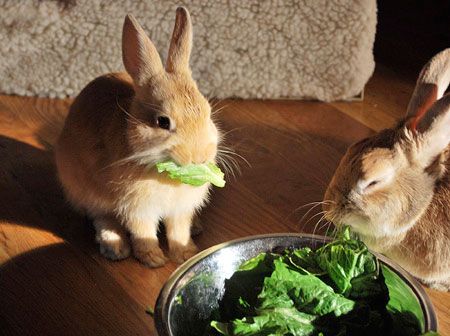Winnebago County Animal Services adopts rabbits to be family pets. Under no circumstances should a rabbit be used for food for other animals; for experimentation or laboratory work; or for any other use other than as a family pet. WCAS strictly enforces this policy under the terms of the adoption contract.
Despite what you may have heard, there’s a lot more to a rabbit diet than carrots. What your rabbit eats can significantly impact their quality of life, so keeping your bunny happy means feeding them the right foods. Not sure what to feed rabbits? An approved rabbit food list can help make meal planning easier.
Leafy Greens – Type #1
This type of leafy greens need to be rotated due to oxalic acid content and only one out of three varieties of greens a day should be from this list.
- Parsley
- Spinach
- Mustard greens
- Beet greens
- Swiss chard
- Radish tops
- Sprouts (from 1 to 6 days after sprouting, sprouts have higher levels of alkaloids)
Leafy Greens – Type #2
This type of leafy greens is low in oxalic acid.
- Arugula
- Carrot tops
- Cucumber leaves
- Endive
- Ecarole
- Frisee Lettuce
- Kale (all types)
- Mache
- Red or green lettuce
- Spring greens
- Turnip greens
- Dandelion greens
- Mint (any variety)
- Basil (any variety)
- Watercress
- Wheatgrass
- Chicory
- Raspberry leaves
- Cilantro
- Radicchio
- Bok Choy
- Fennel (the leafy tops as well as the base)
- Borage leaves
- Dill leaves
- Yu choy
Non-Leafy Vegetables
These should be no more than 15% of the diet (about 1 tablespoon per 2 lbs of body weight per day)
- Carrots
- Broccoli (leaves and stems)
- Edible flowers (roses, nasturtiums, pansies, hibiscus)
- Celery
- Bell peppers (any color)
- Chinese pea pods (the flat kind without large peas)
- Brussel sprouts
- Cabbage (any type)
- Broccolini
- Summer squash
- Zucchini squash
Fruits
These should be no more than 10% of the diet (about 1 teaspoon per 2 lbs of body weight per day). NOTE: unless otherwise stated it is more nutritious to leave the skin on the fruit (particularly if organic), just wash thoroughly. IF you are in doubt about the source of the fruit and you are concerned about chemicals in the skin, then remove it.
- Apple (any variety, without stem and seeds)
- Cherries (any variety, without the pits)
- Pear
- Peach
- Plum (without the pits)
- Kiwi
- Papaya
- Mango
- Berries (any type)
- Berries (uncooked)
- Pineapple (remove skin)
- Banana (remove peel; no more than about 2 1/8 inch slices a day for a 5lb rabbit- they love this!)
- Melons (any – can include peel and seeds)
- Star Fruit
- Apricot
- Currants
- Nectarine
Source: ARL – Animal Rescue League of Iowa, Inc. 2018 – https://www.arl-iowa.org/
